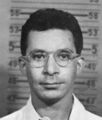Template:Selected anniversaries/May 21: Difference between revisions
No edit summary |
No edit summary |
||
| Line 21: | Line 21: | ||
||1871 – French troops invade the Paris Commune and engage its residents in street fighting. By the close of "Bloody Week", some 20,000 communards have been killed and 38,000 arrested. | ||1871 – French troops invade the Paris Commune and engage its residents in street fighting. By the close of "Bloody Week", some 20,000 communards have been killed and 38,000 arrested. | ||
||Marcus Beck (d. 21 May 1893) was a British professor of surgery at University College Hospital. He was an early proponent of the germ theory of disease and promoted the discoveries of Louis Pasteur, Robert Koch, and Joseph Lister in surgical literature of the time. | |||
||1894 – August Kundt, German physicist and academic (b. 1839) | ||1894 – August Kundt, German physicist and academic (b. 1839) | ||
Revision as of 09:24, 8 December 2017
1471: Painter, engraver, and mathematician Albrecht Dürer born. He will introduction of classical motifs into Northern art through his knowledge of Italian artists and German humanists.
1670: Astronomer and physicist Niccolò Zucchi dies. He published works on astronomy, optics, mechanics, and magnetism.
1923: Mathematician and academic Armand Borel born. He will work in algebraic topology, and in the theory of Lie groups. He will contribute to the creation of the contemporary theory of linear algebraic groups.
1932: Bad weather forces aviator Amelia Earhart to land in a pasture in Derry, Northern Ireland, after flying solo across the Atlantic Ocean.
1946: Physicist Louis Slotin is fatally irradiated in a criticality incident during an experiment with the demon core at Los Alamos National Laboratory.
1953: Logician and mathematician Ernst Friedrich Ferdinand Zermelo dies. His work had major implications for the foundations of mathematics; he is known for his role in developing Zermelo–Fraenkel axiomatic set theory, and for his proof of the well-ordering theorem.





